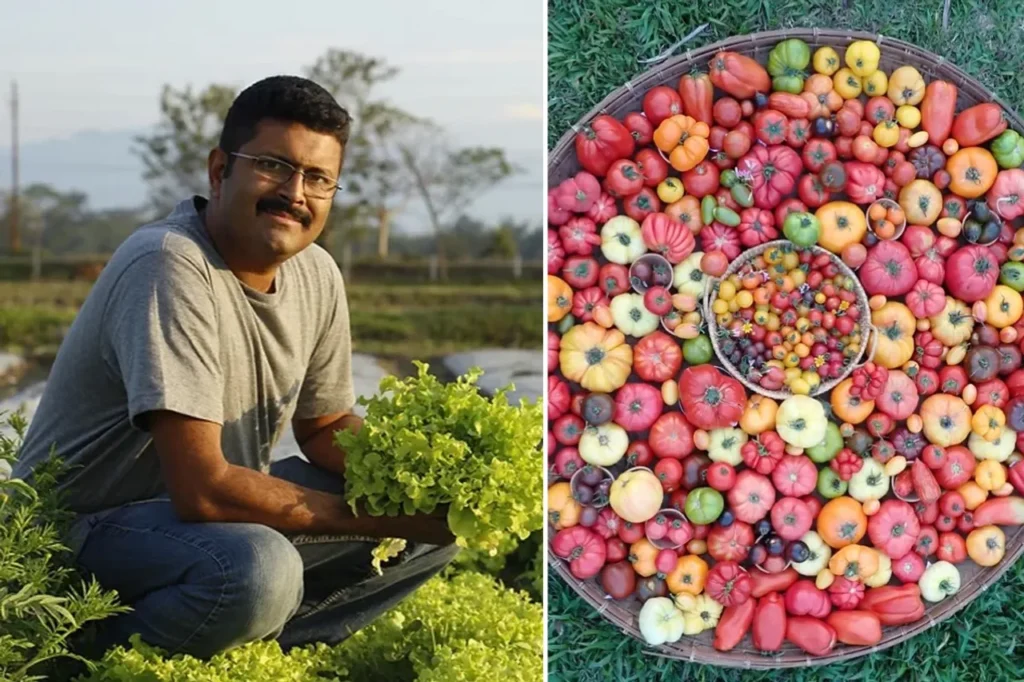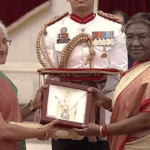
Source:- 30shades.com
Early Roots in Agriculture
This narrative unfolds against the backdrop of Neelam Dutta, an assiduous cultivator hailing from Assam, who embarked upon the organic farming journey at the tender age of 18. Recognizing the pivotal role organic seeds play in farming, he initiated their collection in 2008.
Pabhoi Greens: More Than Just Seeds
His enterprise, Pabhoi Greens, not only vends native seeds but also imparts invaluable training in seed conservation, empowering fellow farmers.
A Life Intertwined with Agriculture
The tapestry of Neelam’s life interwove with agriculture at an early age. Upon his father’s demise during his eleventh-grade studies, Neelam assumed the mantle of the family farm in Pabhoi, Sonitpur district, Assam. Driven by a desire to combat the environmental repercussions of conventional agriculture, Neelam transitioned to organic farming in 2003 after two years of arduous learning.
Diversification: A Necessity Unveiled
While tending to six hectares of family land, cultivating paddy and rearing fish, Neelam discerned a deficiency in farm diversity. The realization that mono-cropping depletes soil fertility over time and diminishes predator populations necessitated a shift. Thus, he diversified into vegetable cultivation, recognizing the organic seeds as the linchpin of organic farming.
The Heirloom Seed Quest
In 2008, Neelam’s epiphany dawned – the heirloom seeds were vanishing, overshadowed by the proliferation of genetically modified or hybrid counterparts. A zealous quest ensued, involving the collection of indigenous seeds from villagers, elderly farmers, and acquisitions from organic seed companies.
Pabhoi Greens’ Conservation Mission
Beyond personal conservation, Pabhoi Greens spearheads self-help groups in distant locales like Arunachal Pradesh and Nagaland. Ethical pricing and direct selling in the market characterize these ventures. Neelam’s endeavors have contributed to the preservation of over 800 varieties of native vegetables and 200 types of indigenous paddy, marking Pabhoi Greens as the first seed conservation entity in the Northeast, with farmers actively propagating organic seeds.
A Diverse Repertoire: Seeds that Tell Stories
Pabhoi Greens’ repertoire boasts a staggering array – 200 types of tomatoes, a hundred each of capsicum and chillies, alongside other vegetables, each exhibiting distinct characteristics. These seeds, adaptable to diverse Indian climatic zones, are retailed online, with annual sales exceeding 8,000 packets.
A Holistic Approach: From Breeding to Market
Diverging from conventional seed procurement models, Pabhoi Greens engages in breeding, research, distribution, and sales, establishing a holistic approach to organic farming. Neelam’s commitment extends to training farmers in regenerative techniques, empowering approximately 20,000 individuals in seed conservation, fostering self-reliance, and creating a local market for organic produce.

Balancing Act: Conservation and Commercialization
In the dual role of a seed conservationist and organic farmer, Neelam strives for equilibrium between conservation and commercialization. Cultivating native varieties of organic rice and vegetables, he ensures direct sales to local markets and farmer cooperatives. The organic farming practices encompass the meticulous preparation of various composts and biopesticides on the farm.
A Gene Pool of Heritage: Pabhoi Greens’ Indigenous Rice Varieties
Pabhoi Greens boasts a gene pool of 200 indigenous rice varieties, including aromatic Nanyya rice, Madhuri, Joha, sticky gum rice, black rice, and soft rice. The cultivation, spanning around 20 acres, aligns with the June to November timeline. Neelam’s pursuit of balancing conservation and commercialization is not merely an individual quest; it is a testament to the resilience and sustainability of organic farming in the Northeast.
Click Here For More Success Stories
Conclusion: Seeds of Sustainability
In the organic odyssey of Neelam Dutta, the seeds of sustainability have taken root. His commitment to preserving indigenous varieties and empowering farmers reflects the delicate dance between conservation and commercialization, creating a model for sustainable agriculture in the Northeast.
FAQs: Unveiling the Layers of Organic Farming
- How did Neelam Dutta initiate his organic farming journey?
- Neelam started his organic farming journey at the age of 18 in Assam, driven by a recognition of the importance of organic seeds.
- What sets Pabhoi Greens apart in the realm of seed conservation?
- Pabhoi Greens goes beyond personal conservation, actively engaging in self-help groups, ethical pricing, and direct selling to preserve native seeds.
- How diverse is Pabhoi Greens’ seed repertoire?
- Pabhoi Greens boasts a diverse array of seeds, including 200 types of tomatoes, a hundred each of capsicum and chillies, contributing to over 800 varieties of native vegetables.
- What is Neelam Dutta’s dual role in organic farming?
- Neelam plays a dual role as a seed conservationist and organic farmer, aiming for a delicate balance between conservation and commercialization.
- How has Pabhoi Greens contributed to sustainable agriculture in the Northeast?
- Pabhoi Greens’ initiatives, including training farmers and preserving indigenous varieties, showcase a model for sustainable agriculture in the Northeast.









